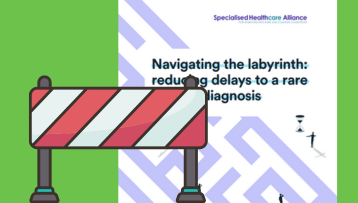1 April, 2015 | By Shaun Lintern
NHS England has been accused of misleading government ministers and labelled a ‘dysfunctional organisation’ over delays in drawing up a prescribing policy for drugs to treat rare diseases.
Health charities and Liberal Democrat MP Greg Mulholland have also accused the government of refusing to intervene despite ministers having the power to do so.
The row follows a delay of nearly two years by NHS England to come up with a prescribing policy for three licensed drugs proven to be effective against rare conditions affecting more than 180 adults and children in England.
The drugs involved are:
• Everolimus to treat tumours caused by tuberous sclerosis complex;
• Elosulfase alfa, or Vimizim, to treat Morquio disease, which leads to permanent disability; and
• Ataluren to treat Duchenne muscular dystrophy.
It has been claimed by charities and a consultant that the delays in a policy for everolimus have contributed to at least two avoidable deaths.
NHS England has not put in place an interim funding policy for all three drugs after the previous process was abolished by the Health and Social Care Act 2012. Its replacement process was scrapped by NHS England last year amid claims it was discriminatory against people with rare conditions.
Currently, patients have no access to the drugs because the conditions are too rare to be considered by the National Institute for Health and Care Excellence, and there are too many patients to qualify for “exceptional funding” which is capped at five patients a year.
NHS England told health minister George Freeman last week it was in active discussions with drug company BioMarin, which produces Vimizim.
However, a letter sent earlier in March to James Palmer, clinical director for specialised commissioning at NHS England, from BioMarin group vice president James Lennertz, and seen by HSJ, said that despite making an offer to discount the drug for five years “no response has been received”.
The company has now said it will stop supplying Vimizim free of charge to around 40 patients from May.
Mr Mulholland, whose six-year-old constituent Sam Brown has Morquio disease, last week met with Mr Freeman, charities and representatives from drug companies. He sent Mr Freeman a letter detailing NHS England’s failures, which he shared with HSJ.
Mr Mulholland said NHS England’s behaviour was “entirely unacceptable”, adding: “This whole business has been a fiasco and shows NHS England is a dysfunctional organisation. That is why there is a responsibility on ministers to step in and hold NHS England to account for their clear failings.”
He said the next government “must intervene swiftly”, adding: “The families involved can’t wait any longer.”
In a letter to the Tuberous Sclerosis Association, the Department of Health said ministers cannot intervene in the process. However, a framework agreement between the DH and NHS England signed last year says the health secretary can issue directions to the national commissioning body if they consider “that NHS England is significantly failing in its duties and functions”.
Jayne Spink, chief executive of the charity, said: “That we have reached a position where the evidence of the need for ministerial intervention is so clear and yet still patients are left to suffer needlessly is beyond belief.”
She said a new government needed to act quickly to ensure access to the drugs and carry out a thorough review of NHS England’s processes.
Christine Lavery, chief executive of the Society for Mucopolysaccharide Diseases, told HSJ: “After three meetings with George Freeman it is obvious that NHS England is lying to the minister. NHS England told him that they were in ‘active discussion’ with the pharmaceutical company, which is not true. The government needs to demonstrate that when process fails, they have a duty of care to intervene before avoidable deaths occur.”
HSJ asked the DH for a response last week but was told on Monday that despite a statement being available, it would not be released due to election purdah.
A spokesman for NHS England said it would listen to the results of an ongoing public consultation on the issue and added: “It’d be wonderful to be able to fund everything and do so instantly, but unfortunately that’s never been the reality.”
Despite the lack of a policy being developed, the spokesman said an “annual process” to identify the priorities for new treatments was now happening.









































































































































